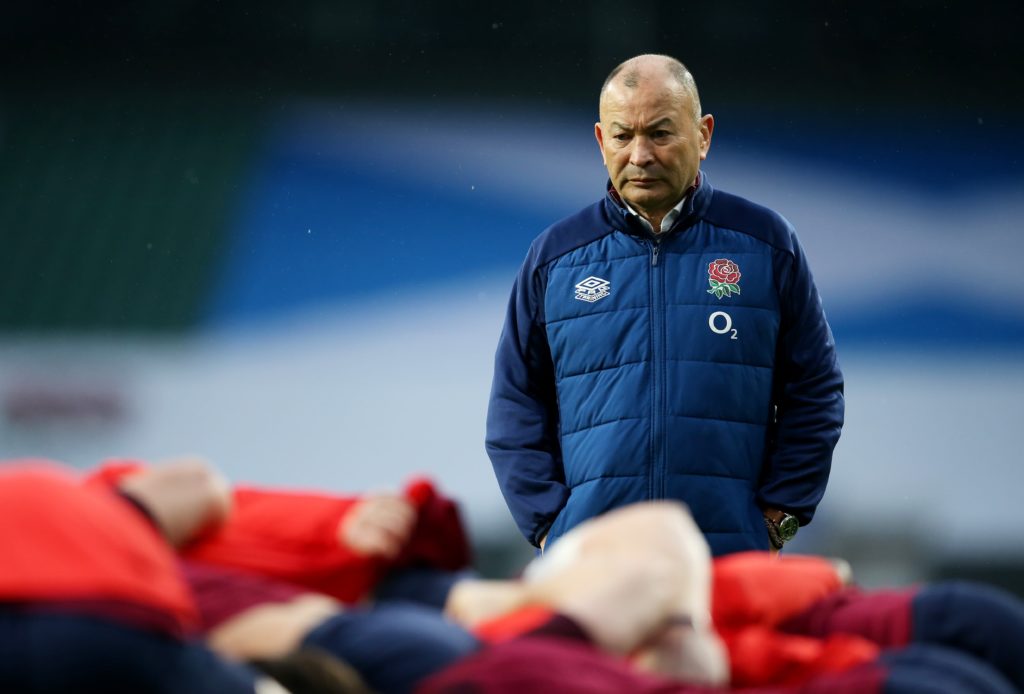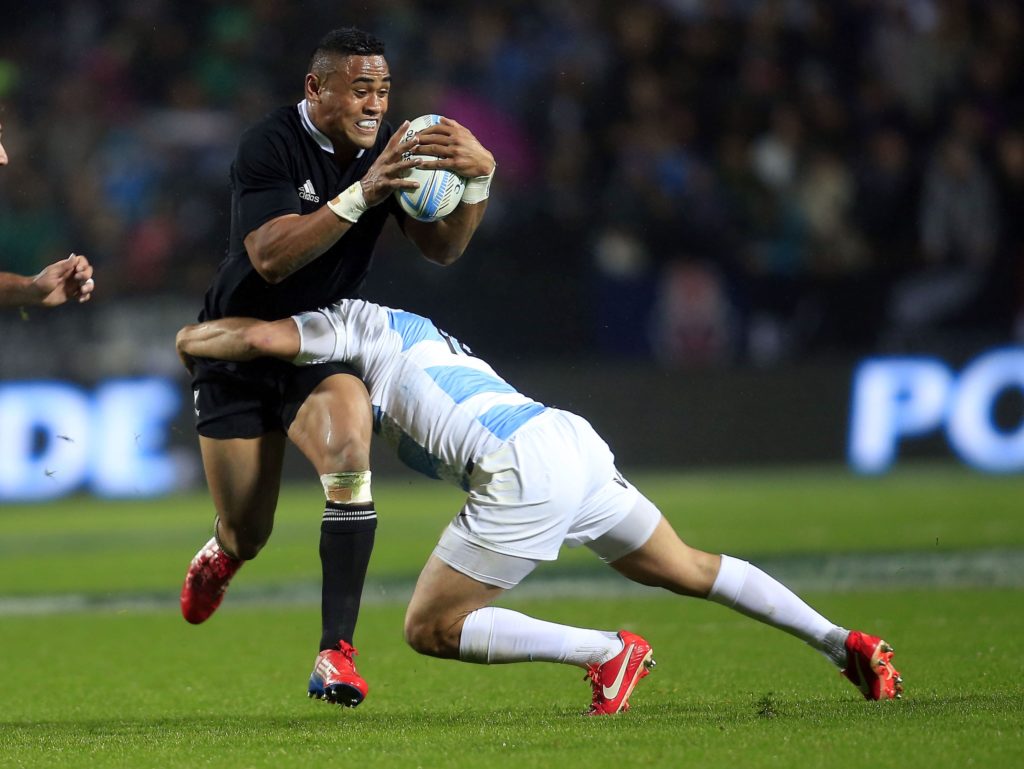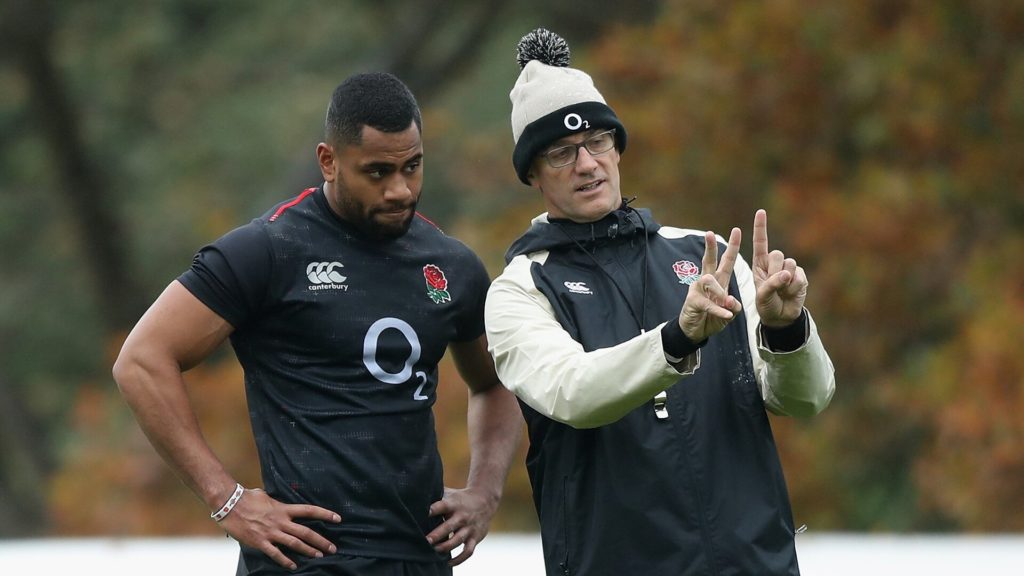There may have been a misreading about who gained what when Eddie met Beauden.
In the normal run of events, the incumbent coach of England wouldn’t normally find himself in direct and regular contact with one of the key decision-makers and most extraordinary talents in the All Blacks backline.
But two factors that sit outside the ordinary have conspired to bring Beauden Barrett and Eddie Jones together. The former is in the midst of a one-season sabbatical with Suntory Sungoliath, the club at which Jones has held a consultancy role for the last 20 years.
And so, two men who, after May this year, will move firmly into opposition camps and unlikely say another word to one another until after the 2023 World Cup, are currently working in close proximity.

There was a bit of outrage in England about that, sparked when Barrett revealed he has been pocketing what he says have been golden nuggets of advice from Jones.
“He’s in all day, so if you walk past him there’s always a conversation, a rugby conversation, whether it’s feedback or, ‘Did you see this?’ or ‘Did you see that?’” Barrett said.
“He’s like that with all the players. He’s certainly a wealth of knowledge. He’s been around, he understands rugby and I genuinely know he’s great for Suntory.
“It’s what hopefully is going to make me a much better player, so I’ll keep it to myself. But he does offer some good value.”
The view in England was that Jones should not be leaking intellectual property to a direct competitor. And why would the Rugby Football Union be okay with the coach of England, helping a key All Black?
Valid questions indeed, except perhaps those asking them missed the other side of the equation which is that Jones will be mining as much, if not more from Barrett.
He’s in all day, so if you walk past him there’s always a conversation, a rugby conversation, whether it’s feedback or, ‘Did you see this?’ or ‘Did you see that?’”
Beauden Barrett on Eddie Jones’ role at Suntory
No doubt Barrett was genuine when he said that Jones has offered him real and significant advice. That’s the headline news because it fits the logical order of our understanding – that a coach or consultant is there to impart wisdom designed to improve the standing of the player.
But this simple view fails to realise that Jones is the real winner in his relationship with Barrett.
The England coach is always the smartest one in the room and he’ll have lifted the bonnet of Barrett these past few weeks and seen plenty to work with and use the next time England play the All Blacks.
He’ll have seen, for himself, how Barrett operates at training. Jones will have picked up strengths and weaknesses in Barrett’s game and been given a deep insight into how, the man many still feel is the best No 10 on the planet, sees the tactical side of rugby.
Unquestionably, Barrett will have exposed more of his true self to Jones than Jones has to Barrett and while that isn’t something that of itself hands England the keys to beating the All Blacks the next time they meet, it’s the sort of tiny gain that matters when the stakes are high and the two teams so evenly matched.
And this question of protecting intellectual property is one that seems more pertinent to be asking about New Zealand than it does England.

There is a widely held view that New Zealand are the masters at protecting their rugby knowledge: that the recipe for the secret sauce is closely guarded and fiercely protected.
But it’s hard to know why that school of thought exists and certainly, it’s right to be asking how the All Blacks will be able to keep a tight grip on their intellectual property should New Zealand Rugby follow through with its plans to sell a stake in its future commercial revenue to US investment firm, Silver Lake.
Protection of assets has been an increasingly difficult business for New Zealand Rugby in the last decade. New Zealand’s players and coaches are in demand around the world and pop up everywhere.
At the 2015 World Cup, Scotland, Ireland and Wales all had Kiwi coaches. So too did Georgia, Fiji and Canada and it would have been possible – and still is today – for several world class international teams to be formed if the selection criteria was being born and developed in New Zealand.
Bit by bit, knowledge is taken offshore and used against the All Blacks. Rugby intelligence drips out of New Zealand.
The Wallabies currently have a Kiwi coach and several players who were born and raised in New Zealand, while the Japanese league is crawling with New Zealanders and of course, the Brave Blossoms also have a former All Black, Jamie Joseph, as head coach.
Bit by bit, knowledge is taken offshore and used against the All Blacks. Rugby intelligence drips out of New Zealand.
It’s a phenomenon that goes mostly unchecked or unnoticed, but there have been times it has been impossible to ignore. One such occasion occurred in 2013 when Graham Henry turned up in the Pumas coaching team.
Having steered the All Blacks to World Cup glory in 2011, Henry stepped down from the role and accepted a consultancy contract to work with the Pumas coaching team in 2012, alongside a role he took mentoring John Kirwan at the Blues.
It made sense – Henry, a wise old head, parachuted into the Pumas where he would not work with the players, but only advise the coaching team. But in 2013, his role evolved: he became a technical adviser and was hands-on with the players as well as the coaches.

It made for the most awkward dynamic when, in September that year, an injury crisis saw the All Blacks hand a test debut to Blues midfielder Francis Saili. He would be playing against Argentina in Hamilton, something which greatly concerned then All Blacks coach Steve Hansen.
He was upset that Henry, in his capacity as Blues technical adviser, had in depth knowledge of Saili that he would be able to feed into the Pumas coaching team and help them exploit the youngster’s inexperience.
Sure enough, Saili’s first act in test football was to drop the ball under pressure and concede a try with barely a minute on the clock.
It was a scenario which provoked then NZR chief executive Steve Tew to comment on the whole issue of protecting intellectual property.
“We had an agreement with Graham and Argentina for a period of time that he would assist them as they tried to get competitive and comfortable in this [Rugby Championship] competition,” Tew said.
“We also saw some benefits in having him assist John Kirwan at the Blues particularly early on in his coaching career back here in New Zealand. So we have weighed that up and believe the benefits outweigh the risks. But it is something we will keep an eye on. It is awkward watching Sir Ted in the Pumas’ coaching box, isn’t it?”
The closely guarded secrets that have enabled the All Blacks to rule the rugby world are going to become a commodity for sale and the likes of Jones, will be able to mine far more than they ever imagined, probably by doing nothing more than Googling.
Just as awkward for Tew was the scenario he encountered the following year in Johannesburg ahead of the clash with South Africa.
As the All Blacks ran through their most critical training of the week on the Thursday before the test, at the far end of the ground was a marquee set up by lead sponsor AIG.
The American insurance group had been allowed to bring key personnel and clients to watch the All Blacks train and had invited John Mitchell to talk them through what was happening.
Mitchell, a former All Blacks coach was working with the Lions at the time, but is of course now England’s defence coach.
That was seven years ago, rendering much of what Mitchell saw that day redundant, but still, it highlights how hard it is for the All Blacks to keep prying eyes out of their business.

It’s a problem that is going to intensify if Silver Lake come on board because one of their plans to grow revenue includes effectively selling access to All Blacks leadership.
There are plans to build centres of excellence around the world – which will make it possible for those with money to buy access to All Blacks’ intellectual property, be it in the form of seminars, coaching clinics or other means.
Silver Lake are forecasting they will jump NZR’s revenue from its current $190 million a year to $500m a year in five years and while broadcast income and merchandise sales will be at the heart of that increase, some of the money is going to come from selling access and giving the world a taste of what happens in the inner sanctum.
The closely guarded secrets that have enabled the All Blacks to rule the rugby world are going to become a commodity for sale and the likes of Jones will be able to mine far more than they ever imagined, probably by doing nothing more than Googling.
There is nothing we can do about that other than once a coach or player signs a contract to leave New Zealand, to restrict their access to what we have. The reality is IP is going to be pretty stale, pretty quickly anyway but there are some sensitivities that we have to manage as best we can.
Former NZR chief executive Steve Tew in 2013
What he got out of Barrett these past few weeks will pale in comparison with what might be available in years to come.
“It is a balancing act because we do want to help some nations develop and grow,” Tew said back in 2013 about the challenge of protecting assets and yet helping others build their expertise.
“But equally we live in an open, global rugby economy and our intellectual property particularly among the coaches and players is spread out all over the world.
“There is nothing we can do about that other than once a coach or player signs a contract to leave New Zealand, to restrict their access to what we have. The reality is IP is going to be pretty stale, pretty quickly anyway but there are some sensitivities that we have to manage as best we can.
“But frankly, we are best trying to control what we can, which is growing our own physical and technical abilities and staying ahead of everyone else.”
It seems that Jones will not be the first high profile opposition coach to get unrestricted access to key All Blacks assets.


Comments
Join free and tell us what you really think!
Sign up for free